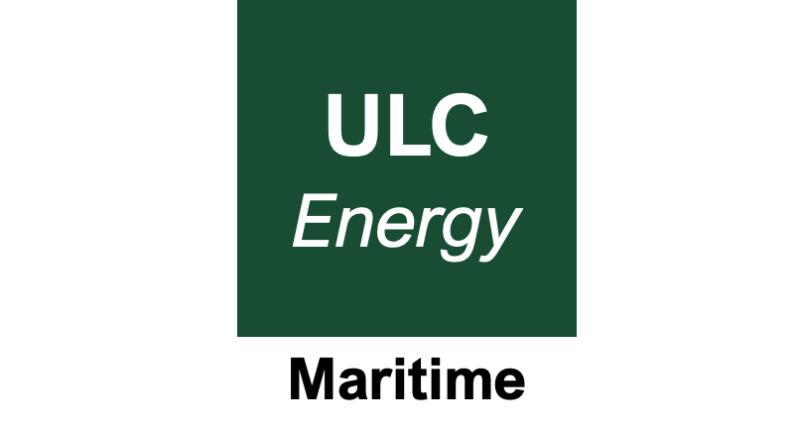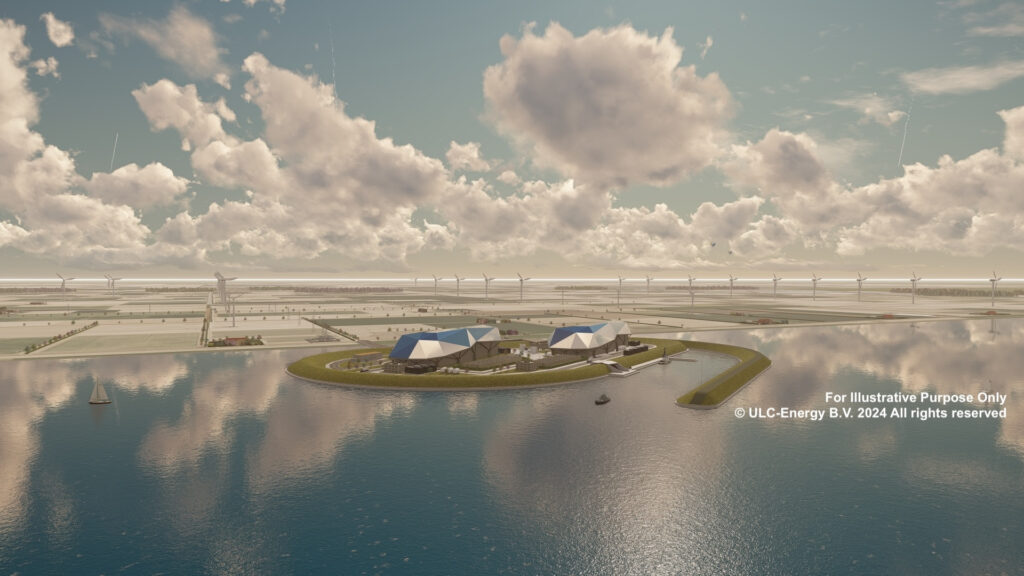A Dutch nuclear research company is investigating the possibility of equipping Newcastlemax bulk carriers with nuclear propulsion systems.
Supported by C-Job Naval Architects, the company has conducted a detailed study analyzing the design and economic impact of civilian nuclear power, comparing it with vessels using conventional Very Low Sulphur Fuel Oil (VLSFO) and green ammonia.
Text by Hiro Yamamoto
Photo courtesy of ULC-Energy

ULC-Energy (ULC), a nuclear development and consulting firm, has completed a comprehensive analysis of the design and economic implications of using civilian nuclear reactor technology on Newcastlemax bulk carriers. These bulk carriers, generally around 200,000 DWT, are designed to maximize cargo capacity at ports shipping coal from Australia. Historically, the use of nuclear propulsion for maritime vessels has primarily been considered for ultra-large container ships and LNG carriers. In contrast, dry bulk vessels, which operate across multiple routes, have not undergone comparative analyses with other emerging fuels concerning greenhouse gas emissions.
This study compared a nuclear-powered Newcastlemax bulk carrier with vessels powered by traditional Very Low Sulphur Fuel Oil (VLSFO) and green ammonia.
In a collaborative effort with C-Job Naval Architects, ULC-Energy (ULC) has investigated the impact of different fuel types on vessel design, greenhouse gas emissions, and commercial performance. By leveraging C-Job’s expertise in naval architecture and alternative fuels, along with ULC-Energy’s advanced reactor technology and knowledge of nuclear economics, a detailed analysis was conducted.
ULC outlined the findings as follows:
1. Structural and Safety Modifications: The integration of nuclear reactors into Newcastlemax bulk carriers requires minimal structural and safety adjustments, resulting in negligible impact on cargo capacity.
2. Operational Costs: Nuclear propulsion offers the lowest operating cost per ton, significantly lower than alternative fuels such as ammonia or VLSFO. Although the lower fuel cost of nuclear energy is partly offset by the high capital expenditure required for ship construction, the study concludes that nuclear-powered Newcastlemax bulk carriers can operate longer, faster, and more cost-effectively—all while producing zero greenhouse gas emissions.

3. Support for Decarbonization Goals: Nuclear-powered Newcastlemax bulk carriers have virtually zero greenhouse gas emissions, making them a superior option to green ammonia-fueled vessels. This suggests that nuclear propulsion could support the shipping industry’s decarbonization objectives.
“This study further advances ULC-Energy’s mission to provide unique, evidence-based analysis for the integration of nuclear technology across various industries,” said Dirk Rabelink, CEO of ULC-Energy.
Niels De Vries, Head of Energy at C-Job, added: “This study represents another significant milestone in the adoption of nuclear energy for marine vessels. It demonstrates C-Job’s ability to collaborate flexibly with clients, combining our design expertise to deliver substantial value. It’s also a prime example of how we can leverage our strengths in system integration and risk-based design to make the shipping industry more sustainable. We highly value our partnership with ULC-Energy, experts in nuclear technology and fuels, and look forward to collaborating on future projects.”
The study acknowledges that civilian nuclear marine propulsion faces challenges related to licensing, operation, and other regulatory issues. Most nuclear reactor designs considered for maritime use are still at the conceptual stage, making current estimates of capital costs for such vessels limited. However, the report indicates that as the project progresses, the accuracy of these estimates is expected to improve.
■About ULC-Energy:
Founded in Amsterdam, the Netherlands, in 2021, ULC-Energy is a nuclear energy development and consulting firm. The company operates under the belief that nuclear energy offers unparalleled advantages in terms of reliability, cost efficiency, and environmental impact.
■ About C-Job Naval Architects:
C-Job Naval Architects is an independent ship design and engineering company specializing in naval architecture, system integration, and alternative fuel technologies. C-Job is dedicated to providing cutting-edge designs that promote sustainability and efficiency in the maritime industry.
〆オランダの原子力調査会社、ニューカッスルマックス型バルクキャリアに原子力推進機関の搭載の可能性を調査。
同社は、C-Job Naval Architectsの支援を受け、民間原子力発電の設計、経済的影響を分析し、従来の超低硫黄燃料油(VLSFO)やグリーンアンモニア燃料船との比較を実施した。
原子力開発、コンサルティング会社であるULC-Energy(ULC)は、ニューカッスルマックス型バルクキャリアに民間原子力炉技術を使用する際の設計および経済的影響について詳細な調査を完了した。
ニューカッスルマックス型バルクキャリアは豪州の石炭積み出し港への配船に合わせた最大船型で一般的に20万重量トンクラスである。従来、船舶用の原子力推進機関は超大型のコンテナ船やLNG船への搭載が前提となっており、ドライバルクへの搭載は配船先が複数になるため、他の新燃料との温暖化ガスの排出の比較などは行われていなかった。
今回の調査では、原子力推進のニューカッスルマックス型バルクキャリアと、従来の超低硫黄燃料油(VLSFO)およびグリーンアンモニアを燃料とする船舶との比較を行った。
(Text by Hiro Yamamoto)
Photo courtesy= ULC-Energy
今回、ULCはC-Job Naval Architectsとの共同作業により、各燃料タイプにおける設計への影響、温室効果ガス排出量、および商業的パフォーマンスを検討した。C-Jobの造船設計や代替燃料に関する専門知識、さらにULC-Energyの高度な原子炉技術と原子力経済学に関する知識を活用し、詳細な分析を行った。
ULCは具体的な調査結果として次のように述べている。
1. ニューカッスルマックス型バルクキャリアに原子力炉を統合するために必要な構造的、安全性に関する改良は、積載量に与える影響が最小限であること。
2. 原子力推進は、運航コストがトン当たりで最も低く、アンモニアやVLSFOなどの代替燃料に比べて大幅に低いこと。原子力燃料のコストが低いことは、船舶の建造に必要な高額な資本支出によって一部相殺されるものの、原子力推進のニューカッスルマックス型バルクキャリアは、より長く、より速く、そして安価に航行でき、温室効果ガスの排出を一切伴わないと結論づけられた。
3. 原子力推進のニューカッスルマックス型バルクキャリアは、グリーンアンモニアを燃料とする船舶よりも温室効果ガスの排出が少なく、ほぼゼロに等しいことから、原子力推進が海運業界の脱炭素化目標を支援する可能性が示された。
「今回の調査は、原子力技術をさまざまな産業に統合するためのユニークで基礎に基づいた分析を提供するというULC-Energyの使命をさらに推進するものだ」と、ULC-EnergyのCEOであるディルク・ラベリンク(Dirk Rabelink)氏は述べている。
C-Jobのエネルギー部門責任者であるニールス・デ・フリース(Niels De Vries)氏は次のように述べている。「この調査は、海洋船舶への原子力導入におけるもう一つの重要なマイルストーンである。C-Jobが柔軟な方法でクライアントと協力し、設計における知識を組み合わせて大きな価値を生み出すことができることを示した。システム統合とリスクベース設計においてC-Jobの能力を発揮し、最終的に海運業界をより持続可能にする好例でもある。原子力技術と燃料の専門家であるULC-Energyとの協力を非常に評価しており、今後のプロジェクトでも共に仕事ができる」
今回の調査では、民間原子力海運推進が認可、運用、およびその他の課題に直面していることも認めている。海運での利用を検討されているほとんどの原子力炉設計はまだ概念段階にあるため、このような船舶の資本コストに関する現時点での見積もりは限られているが、プロジェクトが進展するにつれて精度が向上するとの意見もある。
■ULC-Energy:
ULC-Energyは2021年にオランダ、アムステルダムで設立された原子力エネルギー開発およびコンサルティング会社。ULC-Energyは、原子力エネルギーが信頼性、経済性、環境負荷の点で比類のない利点を提供できる、という理念に基づき活動してる。
C-Job Naval Architects:
C-Job Naval Architectsは、海軍建築、システム統合、および代替燃料技術を専門とする独立系船舶設計・エンジニアリング会社。C-Jobは、海運業界の持続可能性と効率を促進する最先端の設計を提供することに専念している。
